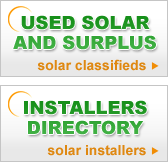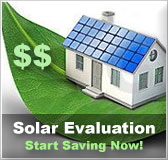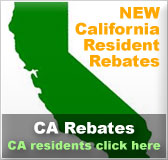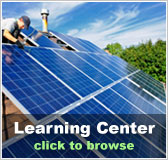Solar energy and small hydropower tax credit:
-This incentive allows residents of South Carolina who purchase and
install solar energy and hydropower systems to claim a tax credit
of 25% of the total cost of equipment, installation and generation
of electricity produced by the system.
-The maximum incentive for each tax payer may claim per taxable year
is $3,500 or 50% of the taxpayer’s tax liability, whichever
is less.
-Any excess credit may be carried forward for ten years.
Palmetto clean energy program:
-This is a green-power program designed to encourage residents of
South Carolina to use renewable energy sources.
-Customer owned, grid-tied solar and wind energy systems are offered
premium payments for the electricity generated. These payments vary
depending on the system.
-Solar and wind systems must have a maximum capacity of five kilowatts
to be eligible.
-The system must supply the energy generated to the South Carolina
power grid and have a power purchase agreement with the utility company
that the energy will be supplied to.
-If the system is participating in this program, it cannot be used
for net metering.
Pilot solar water heating rebate program – Progress energy Carolinas:
-Residents of South Carolina and North Carolina who own residential
solar water heating systems are eligible for a rebate of $1,000 through
this program.
-Systems must meet required certifications and carry specified warranties
to be eligible.
Net metering – Duke Energy, Progress Energy and SCE&G:
- South Carolina customers who own renewable energy systems that
generate electricity have the option to net meter either on a time-of-use
tariff or a flat-rate tariff.
-Both tariffs incorporate fees to the net metering customer.
- System capacity limit is 20 kW for residential customers.
-Net excess generation is credited to the customer's next bill at
the utility's retail rate, and then surrendered to the utility annually
at the beginning of each summer season.
Utility-sponsored loan and rebate programs:
-Many utility loan and rebate programs are available throughout the
state of South Carolina provided by municipal cities and utility companies.
-Details and requirements for each program will vary.
-Loan and rebate programs are available for customers who install
geothermal heat pumps, water heaters and cooling systems.
-Loans are given at low interest to help with the purchase and installation
of geothermal, cooling and water heating technologies.
-Rebates are given as a one time set amount for the initial cost of
heat pumps, water heaters and air conditioners.
Residential renewable energy tax credit:
-This personal tax credit allows the taxpayer to claim a credit of
30% of expenditures including labor costs and installation of qualified
residential solar-electric systems, solar water heating systems or
fuel cells. Small wind-energy systems and geothermal heat pumps can
also be accredited for.
-Solar-electric systems and solar water heaters have a maximum incentive
of $2,000 if placed in service before 2009. There is no maximum incentive
for systems placed after 2008.
-The excess amount of the federal tax credit may be carried forward
to the next taxable year if it exceeds tax liability.
-This can be carried forward until 2016, but after that, it is unknown
if the unused credit will be able to be forwarded.
Residential energy conservation subsidy exclusion:
-This is a personal exemption of 100% of energy conservation subsidies
provided by public utilities.
-The value of a purchase or installation of any energy conservation
measure by a customer such as solar water heat, solar space heat or
photovoltaics will not be included in the customer’s gross income.
-Customers of an electric utility company, who participate in the
utility’s energy conservation program, may receive a rate reduction
of electricity furnished or a nonrefundable credit against the purchase
price of the electricity on each monthly electric bill.
Energy-efficient mortgages:
-This is a federal loan program where homeowners can use EEM (energy-efficient
mortgages) to finance renewable energy technologies in a home.








